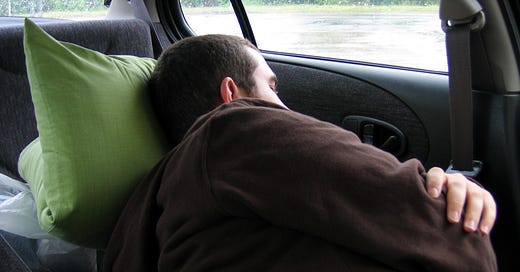Photo by Miracc
Instacart driver.
Warehouse worker.
Office cleaner.
Food service worker.
Homecare provider. Lots of homecare providers.
This is a very incomplete list of the jobs held by clients of ours who we see in eviction court, because even working full-time and more has left them without enough money to pay market-rate rent. Sometimes we are able to help, and they can find the time and space to catch up on rent or move to another place.
Sometimes they can’t.
Those in the latter category become unhoused. They sleep in the back seats of Honda Civics, on a relative’s floor, in a storage unit. Sometimes on the streets. One client ended up sleeping in a neighbor’s garden shed. The neighbor charged her rent to do so.
Then they wake up, clean up the best they can, and report to work.
That fact comes as a surprise to many people who assume that unhoused people are in that state because they are unable to find or keep employment. After all, if you have a job, you can pay the rent, right?
Too often, that is not the case.
So I was grateful to belatedly come across this exceptional July 28th article in the Washington Post, “More of America’s Homeless are Clocking Into Jobs Every Day.” The reporter, Abha Bhattari and Post photographers pull together the stories of people living like too many of our clients do:
· Aaron Reed works 50 hours a week at an Amazon warehouse near Nashville, then returns to his mother’s Hyundai SUV to sleep. He takes the back seat while his mom sleeps up front.
· When Nelfreed McKay finishes his shift as a server at a Manhattan bakery, he then goes and sleeps in Central Park.
· Dog groomer Deborah Bower in San Ramon, California also sleeps in her car most nights. Like some of our clients, she can’t pull together enough money at once to pay a deposit and first month’s rent, but sometimes can get a hotel room for a night or two of respite.
From the article:
Homeless workers who spoke to The Post detailed how they keep up appearances to keep their jobs, stashing their stuff in storage, showering at gyms, washing clothes at truck stops and buying movie tickets so they could rest in a dark, air-conditioned room a few hours at a time. It was imperative, they said, that their workplaces not know about their living situations because they worried about discrimination and job loss.
The great Margot Kushel, MD, director of the Benioff Homelessness and Housing Initiative at the University of California at San Francisco (follow Dr. Kushel on social media for the latest myth-busting research and data on homelessness), told The Post: “The general public doesn’t see these folks as homeless — they’re not as visible as the people who occupy public spaces, who have substance abuse issues or mental health problems. But it’s a catastrophe, and it’s happening just under our eyes.”
That catastrophe is what tenants and housing advocates are working to make a thing of the past. For more about the path they urge us to follow, look to past posts in this newsletter on expanded social housing, rent control, etc., or the websites and social media for the Tenant Union Federation, National Low-Income Housing Coalition, and more.
Podcast Interview
Speaking of “and more,” I was honored to be interviewed as a guest on the Religious Socialism podcast, talking about our work in eviction court and the easier-than-you-think solutions to our housing crisis. The interview released this week can be listened to here.





